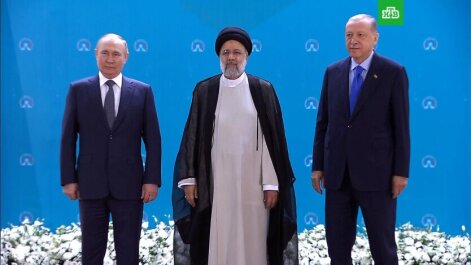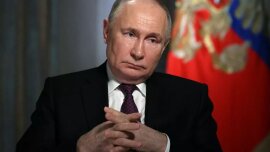The foreign policy of the Russian Federation at the moment is subordinated to two goals that must be achieved in the short term in order to gain the upper hand or create the appearance of victory over Ukraine.
The first goal is to keep non-Western states in the camp of neutral countries. This is the minimum plan that suits Moscow, leaving it room for maneuver in the international arena and the ability to compensate for stagnation with the West by developing relations with other regions.
The second goal is to win over non-Western states to their side. But here we are not talking about the fact that these countries fully and completely supported the actions of the Russian Federation in Ukraine and began to provide military assistance. It is already clear to everyone that this will not happen. Efforts are aimed at convincing these countries to help the Russian Federation in certain predominantly non-military sectors. Basically, we are talking about undermining the Western sanctions regime by creating mechanisms either to circumvent sanctions, or to level their effect, or to compensate by finding an alternative supplier of a particular resource.
And here the Wishlist of the Russian Federation may differ, and, accordingly, their negotiations with different countries. For example, if Turkey or Kazakhstan are of interest to Russia as potential huge transit and logistics hubs, then in the UAE, companies can be used to bypass financial restrictions, Iran is interesting for military-technical cooperation and maintaining regional positions, and China, India, Afghanistan, Bangladesh and the rest are seen as alternative buyers of Russian energy sources instead of Western ones, which will switch to other suppliers in a few years.
One of the main instruments of influence on these countries is Russia's game on their anti-Western sentiments. Do not assume that "anti-Westernism" in these regions is an invention of the Kremlin or a reflection of pro-Russian sentiment. Not at all. These are the mistakes we make all the time when we try to communicate with the non-Western world. Their anti-Western sentiments are conditioned by history, ambitions, nationalism and peculiarities of domestic politics. Russia only manipulates them for its own purposes. However, they are real and have a very strong influence on the position of these countries and their societies. This is especially true for those who want to play a more independent and active role in international affairs. RF just pretends to give them that opportunity.
The weak point of the current positioning of the Russian Federation is the fact that they are politically toxic, and in Ukraine they act in the same way as any other empire acted in the same Middle East or Africa, as the United States acted in some cases, which the Kremlin loves to criticize for the mistakes of the past. Ukraine should take advantage of this, explaining to non-Western countries that we have much more in common with them than they think, and Russia, by and large, does not care about their interests and stability.
Finally, we must remember that there are no "pro-Ukrainian" or "pro-Russian" states and governments. Everyone proceeds from a set of their personal, state interests, beliefs and prejudices. And, for example, the refusal to impose sanctions against the Russian Federation may not be related to Ukraine at all, but to the political and ideological perception of the struggle between the West and the Russian Federation or the desire to confirm their sovereignty by a principled decision to separate from everyone and become neutral.
The key thing to know is that each of these countries has something to lose, and each has its own factor that forces them to be careful in relations with the Russian Federation. For example, China is concerned about falling under sanctions, while Iran has faith in the success of "nuclear negotiations" with the United States. Accordingly, it is in our interests to preserve these factors so that neutral states can maintain maneuverability and maintain neutrality, which also suits us.
And the task of the Russian Federation here is to destroy these factors, to make them irrelevant, in order to drive the same Iran and China into such conditions that will push them to even greater drift towards confrontation with the West and the United States.
For this reason, Russia will gladly support an outbreak of violence in the Balkans, a military escalation in the Taiwan Strait, an escalation of the situation in Karabakh, or a failure of negotiations between the United States and Iran on the nuclear program, which will entail tougher sanctions against Tehran, which means that it will drive it into a framework where Iranians will no longer have an incentive to restrain themselves and be cautious in the context of the war between the West and the Russian Federation.

























